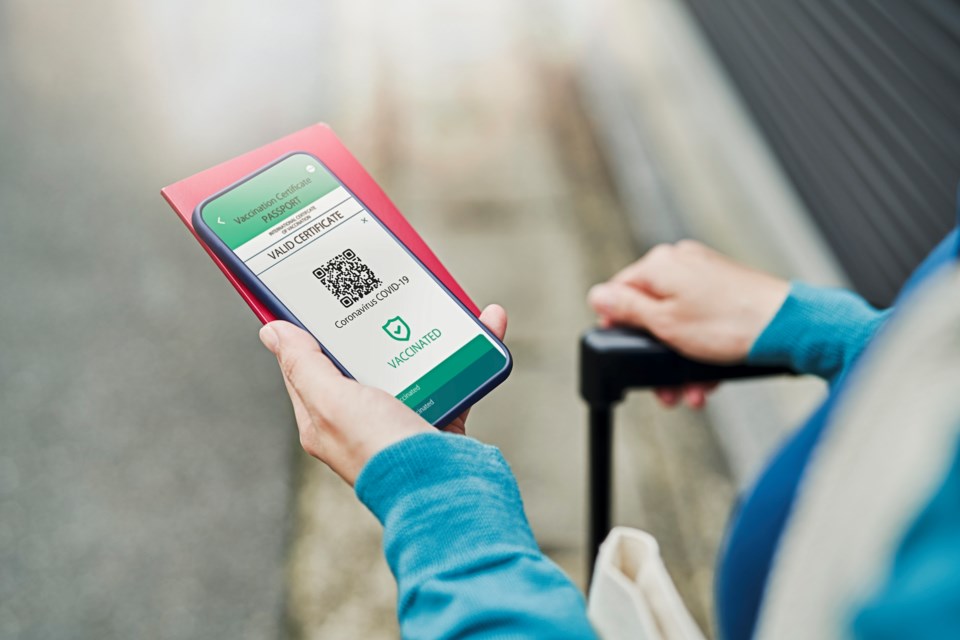When I travelled to Rwanda a few years ago, it took me three planes to reach my destination. Before disembarking each flight, I’d pull out my passport and double check that a yellow card was still tucked inside its pages.
Written on it in blue ink was proof of the yellow fever vaccine I’d received at a travel clinic a few weeks earlier; proof I was required to show border officials in order to be granted entry into the country.
Aside from doubting my ability to not lose the paper card somewhere between Ottawa and Kigali, I didn’t think twice about the requirement. The shot was just another errand to run before taking off, like applying for a visa or procuring a round of malaria pills.
Maybe that’s partly why the idea of requiring proof of COVID-19 vaccination to access certain non-essential services doesn’t faze me. But even without that experience, I doubt my support for B.C.’s recently announced vaccine passports would be different.
I’m entitled to that opinion, just as everyone is entitled to the liberty of choosing whether to get vaccinated.
I support everyone’s right to choose what goes into their bodies, but choices come with repercussions. For some who wholeheartedly believe the risk of being vaccinated outweighs the risk of going without, those repercussions will soon include the inability to sit down at a restaurant, go to a movie or to a sports game or to the gym for the foreseeable future.
I’d direct anyone who’s hesitant about the vaccine to the experts who’ve dedicated their careers to studying vaccines, who overwhelmingly agree that COVID-19 immunizations are effective and the probability of suffering adverse effects associated with the shots is low. For those who remain concerned about the prospect of long-term effects associated with this extra layer of protection, it’s worth noting that the longest time before a side effect appeared for any type of shot was six weeks, as John Grabenstein, director of scientific communication for the Immunization Action Coalition, recently told National Geographic.
The fact of the matter is a vaccine mandate, while controversial, is not the unprecedented oppression some are making it out to be. Even my parents needed to prove I had received a long list of immunizations in order to register me for elementary school. Vaccine records aren’t new.
But like any government policy, it’s also not perfect.
I can sympathize with the few who have legitimate medical exemptions and can’t get vaccinated, and with people— particularly from historically marginalized groups—who struggle to trust governments. I feel for the already-stretched-thin hospitality staff who are now tasked with policing this mandate. I even sympathize with people who have privacy concerns about the initiative’s rollout, even if I don’t share them. (Realistically, I’ve offered up more personal information to a bouncer checking I.D. at a bar.)
But I sympathize more with healthcare workers who are still treating COVID patients in intensive care units a year and a half into this pandemic—most of whom are unvaccinated. As the more contagious Delta variant circulates, government data shows that between Aug. 20 and 26, people not fully vaccinated accounted for 81.7 per cent of new COVID-19 cases and 85.8 per cent of COVID-19-related hospitalizations in B.C.
Where I fail to find any common ground is with those who keep shouting “discrimination” or “rights violations” in response to the initiative.
As Canadians, the hard truth is that our charter rights are not absolute and can be limited for numerous reasons. Secondly, going to a restaurant or a gym or another country is a privilege—no one will need a vaccine to buy groceries, get takeout, go for a run, see friends, or seek medical treatment. And I shouldn’t have to explain how comparing one’s vaccine status to the skin tone someone is born with is wrong.
It’s also worth noting that if a referendum on vaccine passports were held in B.C. today, it would almost certainly pass. In a poll conducted on Pique’s website last week, more than 72 per cent of respondents said they supported the measure. Twenty-six per cent said they were firmly opposed. (A grand total of zero people said they were ambivalent.)
When it comes to the need for this kind of a measure—particularly to avoid more lockdowns—the clearest analogy I’ve seen yet came in a tweet posted by physician and Georgia State senator Dr. Michelle Au.
“Vaccinated people are like wet logs, unvaccinated like dry kindling. COVID is the fire,” she wrote. “Can wet logs catch fire? Yes. Can Wet logs SPREAD fire once they catch flame? Sure. But it’s MUCH harder to start a fire with wet logs, and nearly impossible when there’s no more kindling.”
So let the debate about how best to roll out this initiative rage on, but let’s be done with the unwarranted and misinformed outrage about its existence.





